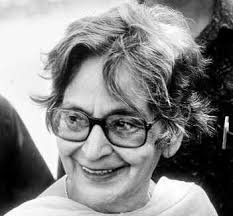The life story of India’s beloved poet, Amrita Pritam on her 100th Birth Anniversary

‘Dur kahin se awaz ayi
Awaz jese teri ho
Kaano ne gehri saans li,
Zindagi ki ladi kaanp uthi
Masuum khushi haath chudha kar
Dono nanhi baahein phaila kar
Ek dosheeza ki tarah
Nange paanv bhaag uthi’
The above poem was written by Amrita Pritam, the first prominent Punjabi woman writer, poet, and essayist of the 20th century. Her countless poems on love and heartbreak have turned her into an immortal romantic and the flag-bearer of broken hearts and unrequited love. During her lifetime, she wrote more than a 100 books on poetry, fictions, biographies, and essays.
One of the most prolific writers of the decade, she became the voice of the women in Punjab at the time of India’s partition. She was a feminist, decades ago, and was self-empowered to live life on her own terms. Her writings were poignant, real, and hard-hitting, and why shouldn’t they be? Her life was full of heartbreaks, tragedies and loneliness. She lost her mother at an early age, got married in a loveless marriage in her teens, gave her heart and soul to love and yet got nothing but excruciating pain in return, and horrors of living half of her life in Pakistan and half in India.
On what would have been her 100th birth anniversary, let’s travel through her life journey and get to know more about this beautiful woman and one hell of a writer.
Amrita was born as Amrit Kaur in Gujranwala, Punjab, on August 31, 1919. Her mother, Raj Bibi, was a school teacher and her father, Kartar Singh Hitkari, was an editor of a literary journal. After Amrita lost her mother at the tender age of 11, Amrita’s belief in God, or any other invisible deity was completely lost. She moved to Lahore and found herself lonely and distracted. This was the time when she started writing poems and stories. By the age of 16, she became a published writer. It was in 1936. She published her first collection of poetry titled Amrit Lehrein – The Immortal Waves.
By the time her work got published, Amrita was already married to Pritam Singh, the son of a wealthy businessman from Lahore. Later in life, Amrita confessed that her relationship with her husband was not healthy and that she didn’t want to get married to him in the first place.
However, she fell in love with an Urdu poet, Sahir Ludhiavi, who later became a popular film lyricist. Amrita fell head over heels for him, but she was married to Pritam. However, that didn’t stop her from romanticizing her love for him in her autobiography titled ‘Rasidi Ticket.’

She mentioned Ludhiavi several times in the book, and mentioned that when she met him, there was more silence than words. They’d write letters to each other. However, Sahir never committed to her, even though, it is said that Amrita was the only woman who could have changed his single status. She called him with several names such as ‘Mera Shaayar,’ ‘Mera mehboob’ and ‘Mera Khuda.’ Their love story also inspired Sahir to write lyrics of songs such as ‘Mehfil se Utha Janey Walo’’
Amrita, eventually, found love and partnership in another writer and artist, Imoz, who was quite younger than her. Even though, they never married, the couple stayed together for more than four decades. Amrita even became the muse of his paintings. They immortalized their love in a book titled Amrita Imroz: A Love Story.

During her illustrious career, she wrote many novels and book of poems. Pinjar is one of her most famous works of literature, which also became a strong voice for the women who suffered hardships at the time of partition. She was the first woman to be conferred with the Sahitya Akademi Award in 1956. She was also honored with some of India’s highest literary awards, such as the Bhartiya Jnanpith Award (1982) and Padma Vibhushan (2004).
Amrita died in the October of 2005 in Delhi. She was survived by Imroz, her daughter, Kandala, and son, Navraj, who was unfortunately, murdered in 2012.
On the occasion of her 100th birth anniversary, we thank Amrita ji for being a light in our lives!














































